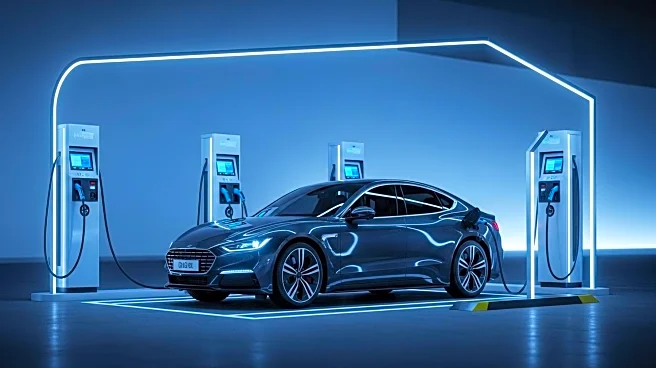What's Happening?
Chevrolet has introduced a new version of its Bolt electric vehicle, priced at $29,990, including the destination charge. The updated model features a 65 kWh usable LFP battery, capable of charging from 10% to 80% in just 26 minutes, significantly improving upon the slower charging rates of previous models. The new Bolt offers an estimated range of 255 miles, although it has not yet received an EPA rating. The vehicle maintains the original Bolt's form factor but enhances its functionality with faster charging and a lower price point, making it a more attractive option for consumers seeking affordable electric vehicles.
Why It's Important?
The introduction of the new Chevy Bolt represents a significant step forward in the electric vehicle market, particularly for consumers looking for cost-effective options. By improving the charging speed and reducing the price, Chevrolet is addressing key concerns that have previously deterred potential buyers. This move could increase the adoption of electric vehicles, contributing to broader environmental goals and reducing reliance on fossil fuels. Additionally, the enhanced Bolt may strengthen GM's position in the competitive EV market, challenging other manufacturers to innovate and offer similar value propositions.
What's Next?
As the new Chevy Bolt enters the market, it is likely to attract attention from consumers and industry analysts alike. GM may continue to refine its electric vehicle offerings, potentially expanding its lineup with more models that emphasize affordability and efficiency. The success of the new Bolt could prompt other automakers to reevaluate their pricing and technology strategies, leading to increased competition and innovation in the EV sector. Furthermore, regulatory developments and incentives for electric vehicles could play a role in shaping the market dynamics and consumer preferences.
Beyond the Headlines
The launch of the new Chevy Bolt may have broader implications for the automotive industry, particularly in terms of sustainability and technological advancement. As electric vehicles become more accessible, there could be shifts in consumer behavior, with more individuals opting for eco-friendly transportation solutions. This trend may also influence urban planning and infrastructure development, as cities adapt to accommodate the growing number of electric vehicles. Additionally, the focus on affordability and efficiency in EV design could drive advancements in battery technology and energy management systems.











